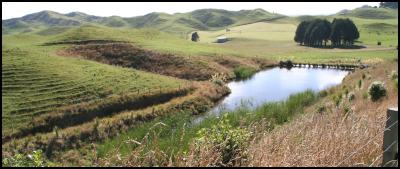Making a Splash for World Wetlands Day
Making a Splash for World Wetlands Day

Click to enlarge
Part of the protected and enhanced wetlands on the Toko dairy farm of Mark and Leigh Caskey, who will host an event marking World Wetlands Day on 3 February.
Taranaki Regional Council
media release
24 January 2008
For immediate
release
MAKING A SPLASH FOR WORLD WETLANDS DAY
A category of natural habitat once considered a waste of good land now has its own international treaty and annual observance day, which will be marked in Taranaki on Sunday, 3 February.
World Wetlands Day is designed to highlight the value of streams, ponds, marshes and other aquatic environments. It celebrates the signing in the 1970s of an international convention promoting the protection and wise use of such wetlands. This year's theme is Healthy Wetlands - Healthy People.
World Wetlands Day will be marked in Taranaki with an open day at the dairy farm of Mark and Leigh Caskey on Wawiri Road near Toko, east of Stratford. Visitors will be able to inspect three wetland gully areas that have been fenced to exclude stock and enhanced through the creation of five areas of open water habitat for gamebirds such as mallard duck and threatened species such as the New Zealand dabchick.
Representatives of the Taranaki Regional Council, Fish and Game Taranaki, the Taranaki Tree Trust and the QEII Trust will also make presentations on the importance of wetlands and the assistance available for land owners to preserve them.
Wetlands do many jobs. They store and purify water; provide flood water control, replenish groundwater; provide nurseries for freshwater and marine fish; store carbon; retain nutrients and sediments; support biological diversity; mitigate climate change; create recreation and tourism opportunities; provide water transport; and much more.
Wetlands are home to more bird, animal and plant species than any other type of habitat.
The projects on the Toko farm were recognised with a Taranaki Regional Council Environmental Award last year.
The Council's Land Services Manager, Don Shearman, says the old attitude that wetlands are waste land is changing as people understand the crucial role they play.
He says the Toko farm is a good example of what can be achieved and the Council can supply advice and information to any land owner interested in similar projects.
The use, development and protection of wetlands is covered by rules in the Council's Regional Freshwater Plan. Seventy-six wetlands are in a specially protected "regionally significant" category, with around two-thirds of these having extra legal protection through voluntary covenants and the like.
"In land management terms, however, all wetlands are important and we will work with land owners and other groups who want to protect and enhance them anywhere in the region."
The 3 February open day starts at 10.30am and the venue will be signposted from the Ahuroa Road-SH43 intersection east of Toko township.
ENDS


 Gordon Campbell: On Our Austerity Fixation And Canada Staying Centre-left
Gordon Campbell: On Our Austerity Fixation And Canada Staying Centre-left Te Pāti Māori: Keep The Window Open- UCOL Must Stay
Te Pāti Māori: Keep The Window Open- UCOL Must Stay Unions Otago: May Day Workers' Hui
Unions Otago: May Day Workers' Hui People Against Prisons Aotearoa: Voting Ban “Undermines Democratic Principles” Says Justice Group
People Against Prisons Aotearoa: Voting Ban “Undermines Democratic Principles” Says Justice Group Taxpayers' Union: Nationwide Hīkoi Calling For Balanced Budgets
Taxpayers' Union: Nationwide Hīkoi Calling For Balanced Budgets Greenpeace: Luxon’s War On Nature Opens Gate For More Dairy Conversion
Greenpeace: Luxon’s War On Nature Opens Gate For More Dairy Conversion NZ Labour Party: Consenting Change Opens Door For Cowboys
NZ Labour Party: Consenting Change Opens Door For Cowboys


